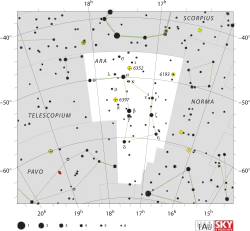V539 Arae
V539 Arae (Bayer designation Nu1 Arae (ν1 Arae / ν1 Ara)) is a triple star system in the southern constellation of Ara. Based upon an annual parallax shift of 3.30 ± 0.47,[1] this system is at a distance of roughly 1,000 light-years (310 parsecs) from Earth.

| |
| Observation data Epoch J2000 Equinox J2000 | |
|---|---|
| Constellation | Ara |
| Right ascension | 17h 50m 28.39341s[1] |
| Declination | –53° 36′ 44.6701″[1] |
| Apparent magnitude (V) | 5.62[2] |
| Characteristics | |
| Spectral type | B2 V + B3 V + A1 V[2] |
| U−B color index | –0.64 |
| B−V color index | –0.08 |
| Variable type | Algol variable |
| Astrometry | |
| Radial velocity (Rv) | -8[3] km/s |
| Proper motion (μ) | RA: +3.18[1] mas/yr Dec.: –11.40[1] mas/yr |
| Parallax (π) | 3.30 ± 0.47[1] mas |
| Distance | approx. 1,000 ly (approx. 300 pc) |
| Absolute magnitude (MV) | –1.83/–1.11[4] |
| Details | |
| ν1 Ara A | |
| Mass | 6.240 ± 0.066[4] M☉ |
| Radius | 4.516 ± 0.084[4] R☉ |
| Luminosity | 1,963[4] L☉ |
| Surface gravity (log g) | 3.924 ± 0.016[4] cgs |
| Temperature | 18100 ± 500[4] K |
| Rotational velocity (v sin i) | 100[3] km/s |
| Age | 23.2 ± 2.9[5] Myr |
| ν1 Ara B | |
| Mass | 5.314 ± 0.060[4] M☉ |
| Radius | 3.428 ± 0.083[4] R☉ |
| Luminosity | 902[4] L☉ |
| Surface gravity (log g) | 4.093 ± 0.021[4] cgs |
| Temperature | 17100 ± 500[4] K |
| Rotational velocity (v sin i) | 130[3] km/s |
| Other designations | |
| Database references | |
| SIMBAD | AB |
| A | |
The core members of this system, ν1 Ara AB, consist of a pair of B-type main sequence stars in a close orbit with a period of 3.169 days and an eccentricity of 0.06. Their respective stellar classifications are B2 V and B3 V, and they have a combined visual magnitude of 5.65. Because the orbital plane lies close to the line of sight from the Earth, this pair form a detached eclipsing binary of the Algol type.[6] The eclipse of the primary causes a decrease of 0.52 in magnitude, while the secondary eclipse decreases the magnitude by 0.43.[7] At an angular separation of 12.34 arcseconds, is the tertiary component of this system; a magnitude 9.40 A-type main sequence star with a classification of A1 V.[2]
The system is sometimes referred as Upsilon1 Arae (υ1 Arae), and more generally unlettered.[8]
References
- van Leeuwen, F. (November 2007), "Validation of the new Hipparcos reduction", Astronomy and Astrophysics, 474 (2): 653–664, arXiv:0708.1752, Bibcode:2007A&A...474..653V, doi:10.1051/0004-6361:20078357, S2CID 18759600.
- Eggleton, P. P.; Tokovinin, A. A. (September 2008), "A catalogue of multiplicity among bright stellar systems", Monthly Notices of the Royal Astronomical Society, 389 (2): 869–879, arXiv:0806.2878, Bibcode:2008MNRAS.389..869E, doi:10.1111/j.1365-2966.2008.13596.x, S2CID 14878976.
- Wilson, Ralph Elmer (1953), "General catalogue of stellar radial velocities", Carnegie Institute Washington D.C. Publication, Carnegie Institution of Washington, Bibcode:1953GCRV..C......0W.
- Torres, G.; Andersen, J.; Giménez, A. (February 2010), "Accurate masses and radii of normal stars: modern results and applications", The Astronomy and Astrophysics Review, 18 (1–2): 67–126, arXiv:0908.2624, Bibcode:2010A&ARv..18...67T, doi:10.1007/s00159-009-0025-1, S2CID 14006009.
- Tetzlaff, N.; Neuhäuser, R.; Hohle, M. M. (January 2011), "A catalogue of young runaway Hipparcos stars within 3 kpc from the Sun", Monthly Notices of the Royal Astronomical Society, 410 (1): 190–200, arXiv:1007.4883, Bibcode:2011MNRAS.410..190T, doi:10.1111/j.1365-2966.2010.17434.x, S2CID 118629873.
- "V* V539 Ara". SIMBAD. Centre de données astronomiques de Strasbourg. Retrieved 2010-07-31.
- Malkov, O. Yu.; Oblak, E.; Snegireva, E. A.; Torra, J. (February 2006), "A catalogue of eclipsing variables", Astronomy and Astrophysics, 446 (2): 785–789, Bibcode:2006A&A...446..785M, doi:10.1051/0004-6361:20053137.
- Note for HR 6622: Hoffleit, D., Warren, Jr., W. H., (1991). The Bright Star Catalogue, (5th Revised Ed).